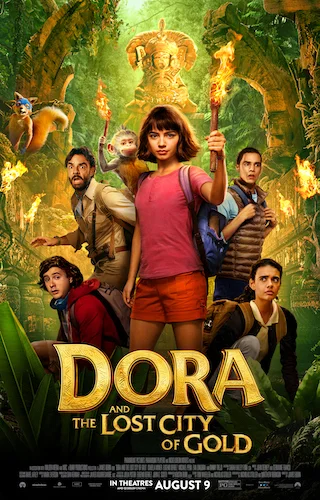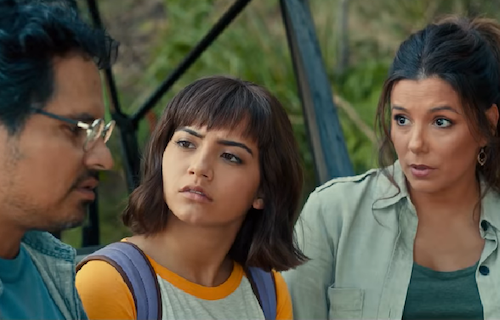Dora and the Lost City of Gold
Very early into the peculiar experiment of making a teenaged live action Dora the Explorer, Dora is reminded that she is, indeed, an explorer and not a treasure hunter. That may seem extremely conflicting right away, since the film’s been promoted as Dora’s trek towards ruins full of gold and jewelry. Unless, we are to believe that she turns against her principles. That doesn’t seem like the Dora many kids grew up with. That isn’t the instructor of good manners and respect. Luckily, that isn’t the Dora we have here. We quickly learn that Dora is merely discovering new things, and applying her smarts to get out of these areas. She isn’t there to tamper with the land, or take from it. Dora and the Lost City of Gold is surprisingly pretty thoroughly thought out. It’s as if director James Bobin and company really wanted this film to have to exist. Dora isn’t really essential, but give it a shot and convince me that the world is any worse now that it does exist. It’s an honest attempt that actually has the occasional moment of true connectivity with its audience.
One major highlight is how self aware the film is. It knows its origins, and it puts this comparison on full blast. This starts with the exaggerated versions of the characters (particularly a wide eyed Dora, who is irritating in the context of the film, but is highly engaging for us, the audience). The film itself begins with a live action take that is more true to the original educational cartoon, including the talking map and backpack. We quickly learn this is the imagination of Dora and her cousin Diego at play. We come to learn that Dora is brilliantly clever, but she is sheltered. She loves the inspiration of her surroundings, and how the intricate science of nature is art in itself. Civilizations are stories. Languages are codes. This film is the lens on the world that showcases how someone eager to learn views everything, and it’s quite a positive image for both children and jaded adults in a cold 2019.
Dora being told by her parents that she is being sent away to the big city for school.
There are even moments that authentically made me laugh (yes, even in a film like this). There’s a moment where character Randy (Nicholas Coombe) remarks that he doesn’t know how to deal with adults that cry, because he “never knows where to look”. It’s a typical awkward-comedy line that gets the extra oomph with that last part, and Coombe’s delivery. On that topic, Isabela Moner is definitely a high point here. Many other leading stars could have made Dora insufferable to bear, or way too single note in tone. It’s easy to go that route for a family film, too, and many studios would not have a problem with that. Moner is one of the driving forces that really wanted this film to work, and so we get a multi dimensional Dora who knows she’s an outcast, has a sharp mind but also a wild spirit, and is not afraid to showcase even a smidgen of emotions to let us know she isn’t a shell of an animated character. If you want to know why I’m hard on some family films and its characters, please refer back to Moner’s portrayal here, and explain to me why effort and passion has to be executed in the name of profit.
Having said all of that, there are some major problems, particularly stemming from the goldmine of plot holes that exist in this film. The main narrative here is that Dora, her cousin, and her classmates have been kidnapped, and that Dora is also trying to save her parents who have gone missing. Why would her parents leave some markings indicating Dora where to go? She was sent to the big city. How would they know she would find them? Even if there was a snowballs chance in hell she could, wouldn’t these markings give clues to the mercenaries that are trying to find the lost city? Wouldn’t they have found these clues first, given the fact that they’re right there, and her parents clearly made these clues while fleeing (even Dora comments on how these clues were made hastily)? There’s also the cute-but-idiotic use of Randy singing the theme to The Phantom of the Opera loudly. Wouldn’t the mercenaries hunting them hear this? Isn’t this, and the poo jokes in the quicksand, also waste time? It clearly did, since it furthered their footing in the quicksand. When Dora’s father makes a joke about knowing the “three” classmates, does he not remember his own nephew Diego (whose family he sent Dora to stay with)? Why does nobody wonder how Swiper can talk, but they question why he wears a mask? He can clearly communicate. Is it just us that can hear him? If so, why do we only hear Boots talk once? Why does Dora hear Boots? Is it just in her head? If so, why does she not question Swiper talking too?
Dora and company stumbling upon rock versions of themselves, that may or may not dictate their fates.
For every distracting plot hole, we have something of positive worth that necessitates a mention. As said, Randy acts like an idiot singing when the gang is trying to hide, but he does come out with the funniest line in the film. Similarly, the nod to the original animation is maybe forced-in, but it’s still a loving throwback (with a current twist) that makes the moment feel essential. There are many other silly moments, or obvious twists, but in the defence of these elements, Dora and the Lost City of Gold is a family film. It’s not even just a family film. It’s a live action, adventure version of freaking Dora the Explorer. It shouldn’t have been even remotely this successful on paper. The greatest achievement Dora has is never once feeling like a cash grab the entire time, and I say that with complete sincerity. You may not want to take part in the campy musical numbers (especially not the one about expelling feces out in the jungle), but you may actually get why the cast and crew were so hellbent on making this film happen. It actually isn’t too shabby. There’s even a not-so-hidden dystentery joke for the whole gang to enjoy.
Andreas Babiolakis has a Masters degree in Film and Photography Preservation and Collections management from Ryerson University, as well as a Bachelors degree in Cinema Studies from York University. His favourite times of year are the Criterion Collection flash sales and the annual Toronto International Film Festival.






